Filter by
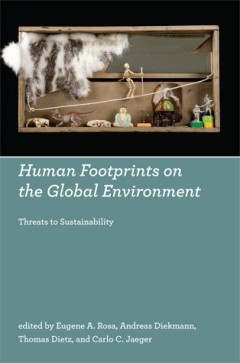
Human footprints on the global environment: Threats to sustainability
"The colossal human ecological footprint now threatens the sustainability of the entire planet. Scientists, policymakers, and other close observers know that any understanding of the causes of global environmental change is a function of understanding its human dimension - the range of human choices and actions that affect the environment. This book offers a state-of-the-art assessment of resea…
- Edition
- -
- ISBN/ISSN
- 9780262259163
- Collation
- 1 online resource (xi, 329 pages) :illustrations
- Series Title
- -
- Call Number
- -

The future is not what it used to be : climate change and energy scarcity
"The future is not what it used to be because we can no longer rely on the comforting assumption that it will resemble the past. Past abundance of fuel, for example, does not imply unending abundance. Infinite growth on a finite planet is not possible. In this book, J?org Friedrichs argues that industrial society itself is transitory, and he examines the prospects for our civilization's coming …
- Edition
- -
- ISBN/ISSN
- 9780262316620
- Collation
- 1 online resource
- Series Title
- -
- Call Number
- -
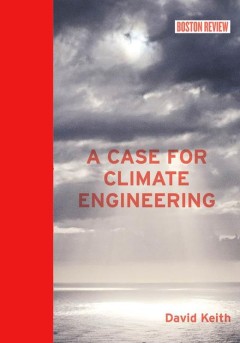
A case for climate engineering
A leading scientist argues that we must consider deploying climate engineering technology to slow the pace of global warming."Climate engineering -- which could slow the pace of global warming by injecting reflective particles into the upper atmosphere -- has emerged in recent years as an extremely controversial technology. And for good reason: it carries unknown risks and it may undermine comm…
- Edition
- -
- ISBN/ISSN
- 9781461943839
- Collation
- 1 online resource (xxiii, 194 pages).
- Series Title
- -
- Call Number
- -

Resigned Activism: Living with Pollution in Rural China
An examination of the daily grind of living with pollution in rural China and of the varying forms of activism that develop in response.OCLC-licensed vendor bibliographic record.
- Edition
- -
- ISBN/ISSN
- 9780262341097
- Collation
- 1 online resource.
- Series Title
- -
- Call Number
- -
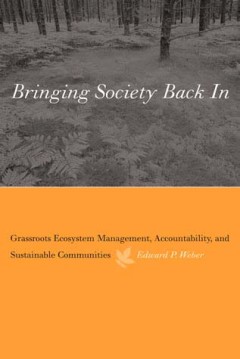
Bringing society back in :grassroots ecosystem management, accountability, an…
In the last two decades, people in a growing number of localities in the United States have developed grassroots ecosystem management (GREM) as a means to resolve policy problems affecting their environment, economy, and communities. Ad hoc and voluntary groups of environmentalists, developers, businesspeople, federal and state resource managers, farmers, loggers, local citizens, and those repr…
- Edition
- -
- ISBN/ISSN
- 9780262285858
- Collation
- 1 online resource (xvi, 317 pages) :illustrations.
- Series Title
- -
- Call Number
- -
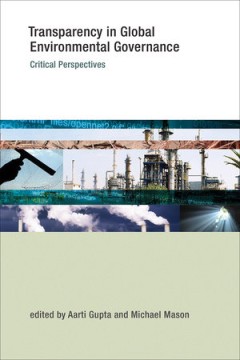
Transparency in global environmental governance : critical perspectives
Transparency is increasingly seen as part of the solution to a complex array of economic, political, and ethical problems in an interconnected world. It is often assumed to result in more accountable and effective governance. The 'transparency turn' in global environmental governance in particular is evident in a wide range of international agreements, voluntary disclosure initiatives, and publ…
- Edition
- -
- ISBN/ISSN
- 9780262320856
- Collation
- 1 online resource.
- Series Title
- -
- Call Number
- -
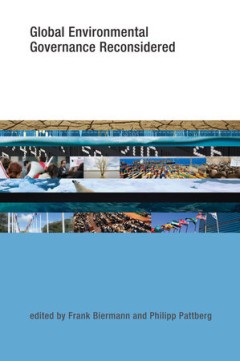
Global environmental governance reconsidered
An examination of three major trends in global governance, exemplified by developments in transnational environmental rule-setting.The notion of global governance is widely studied in academia and increasingly relevant to politics and policy making. Yet many of its fundamental elements remain unclear in both theory and practice. This book offers a fresh perspective by analyzing global governanc…
- Edition
- -
- ISBN/ISSN
- 9780262305709
- Collation
- 1 online resource (xvi, 301 pages).
- Series Title
- -
- Call Number
- -

Ecuador's environmental revolutions ecoimperialists ecodependents, and ecores…
An account of the movement for sustainable development in Ecuador through four eras: movement origins, neoliberal boom, neoliberal bust, and citizens' revolution.OCLC-licensed vendor bibliographic record.
- Edition
- -
- ISBN/ISSN
- 9780262333382
- Collation
- 1 online resource
- Series Title
- -
- Call Number
- -

Governing Complex Systems: Social Capital for the Anthropocene
An exploration of the need for innovative mechanisms of governance in an era when human actions are major drivers of environmental change.OCLC-licensed vendor bibliographic record.
- Edition
- -
- ISBN/ISSN
- 9780262338899
- Collation
- 1 online resource (xiii, 279 pages).
- Series Title
- -
- Call Number
- -
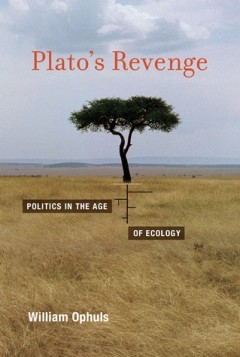
Plato's Revenge: Politics in the Age of Ecology
A provocative essay that imagines a truly ecological future based on political transformation rather than the superficialities of "sustainability."OCLC-licensed vendor bibliographic record.
- Edition
- -
- ISBN/ISSN
- 9780262298520
- Collation
- 1 online resource (xiv, 256 pages)
- Series Title
- -
- Call Number
- -
 Computer Science, Information & General Works
Computer Science, Information & General Works  Philosophy & Psychology
Philosophy & Psychology  Religion
Religion  Social Sciences
Social Sciences  Language
Language  Pure Science
Pure Science  Applied Sciences
Applied Sciences  Art & Recreation
Art & Recreation  Literature
Literature  History & Geography
History & Geography